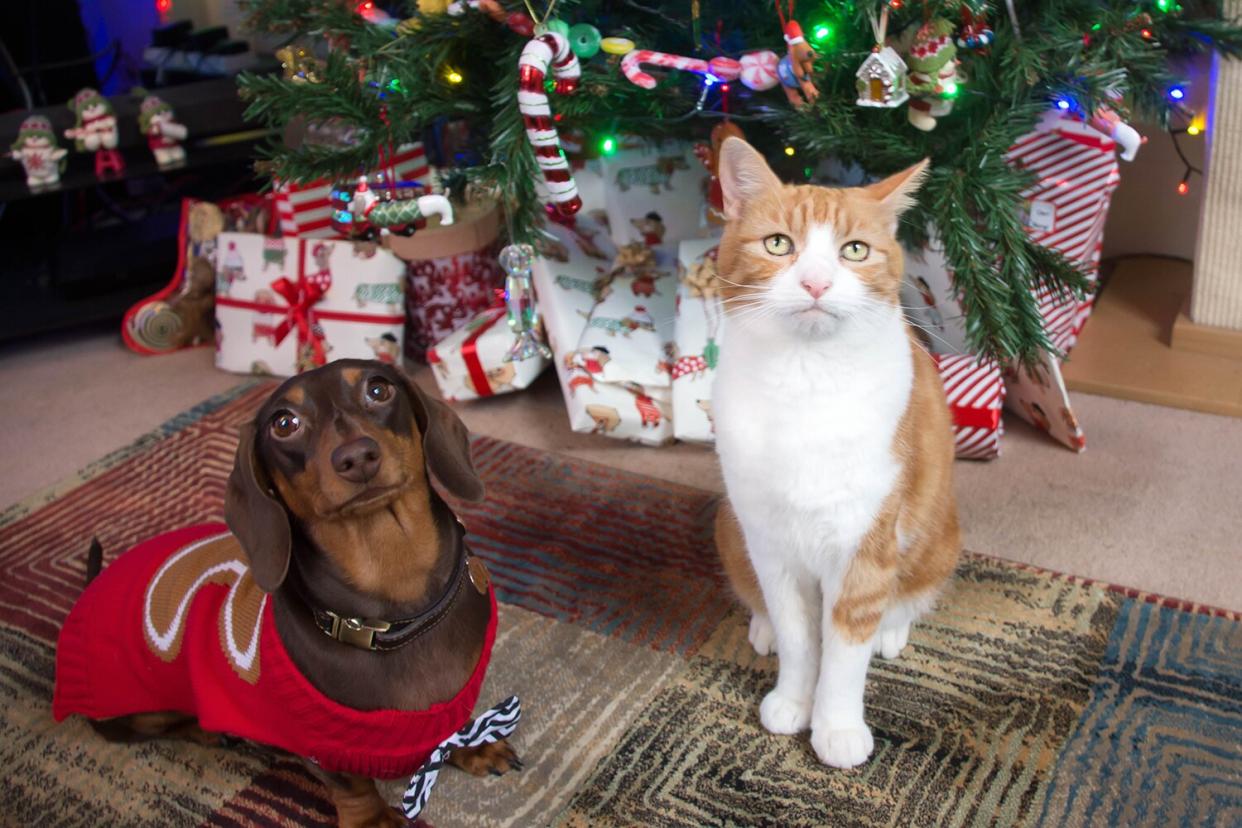Vet Expert Reminds Pet Owners it Is 'Not Safe' for Pets to Drink Christmas Tree Water

Getty
It's early December, which means — aside from early decorators — many are starting to put up their holiday decor, including Christmas trees.
A Christmas tree adds a festive flair to any home but can also bring added issues for pet owners. Cats and dogs are often curious about new things, and brightly lit, ornament-covered, present-surrounded trees are no exception.
To help pet parents enjoy their holiday decorations without added stress, Dr. Audrey Wystrach, a veterinarian and the co-founder and CEO of Petfolk, provide PEOPLE with pet safety tips tailored to holiday decor issues.
Dr. Wystrach recommends owners keep a close eye on their pets around Christmas trees. It is "not safe" for pets to drink the water left at the base of fresh Christmas trees, said the veterinarian, because "the water can be filled with preservatives, pesticides and other agents, such as aspirin, which is commonly added to keep a tree fresh."
Additionally, it is dangerous to let cats and dogs consume any part of a Christmas tree. An evergreen tree's needles and sap can be toxic to pets, and sharp tree needles can puncture the intestines and cause vomiting and diarrhea if ingested.
RELATED: Christmas Trees Will Be More Expensive This Year — But There Will Be Plenty to Go Around
Pet parents with artificial Christmas trees are not spared from pet dangers. The synthetic needles that can be eaten off artificial trees by pets can also pose health problems. Owners who witness their pets trying to eat part of a Christmas tree or drink the plant's water should create a boundary to keep pets from reaching the tree, Dr. Wystrach advised. The same action should be taken to prevent pets from marking Christmas trees.
"Trees are a natural marking place for dogs and cats. Marking is a means of feline and canine communication. Providing physical barriers to block pets from getting near the tree base is the best way to prevent this behavior. There are some pheromone sprays that may be helpful as well," the veterinarian added.
For animal lovers with feline friends who love to climb Christmas trees, Dr. Wystrach has a few natural options to curb this behavior.
"Spray adverse fragrances unfavored by felines, like citrus or apple cider vinegar, to the base of the Christmas tree to deter cats. Or consider placing citrus peels near the base of the tree for a natural remedy that will last a little longer than sprays. Consider wrapping aluminum foil, which our feline friends don't love, around the base of the tree. Hide electrical cords and dangling ornaments, as these hanging objects are sometimes tempting to revisit," she shared.
Unfortunately, Christmas trees aren't the only festive plant that can cause problems for pets. Poinsettias, holly, mistletoe, and amaryllis are popular holiday plants that can be fatal to cats and dogs if ingested. Keep these plants out of any pet's reach. Owners who see their pets eat any of these plants should take them to the vet, especially if a pet exhibits signs of gastrointestinal distress.
RELATED VIDEO: The Australian Firefighters Calendar Creates a Pet-Filled Christmas Video to Spread Cheer
Other holiday decorations that may result in a trip to the animal hospital are tinsel and snow globes. Tinsel should be hung where pets can't reach the garlands because "the string-like object is something cats like to play with and, if swallowed, can cause intestinal obstructions that require surgery. Objects like this can get wound up under the tongue or inside the stomach. These thin strings can be extremely difficult to diagnose on X-ray and can be an expensive surgery," according to Dr. Wystrach.
As for snow globes, many contain ethylene glycol (antifreeze) inside, which is highly toxic to pets.
"If a globe breaks, it only takes a few licks to be fatal," the veterinarian shared.
To learn more about Dr. Wystrach and her work, visit Petfolk.com.

